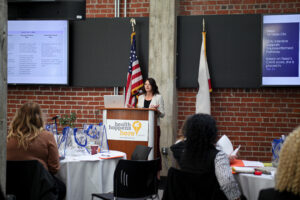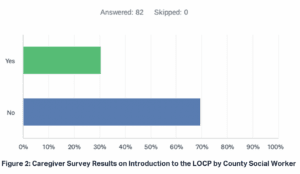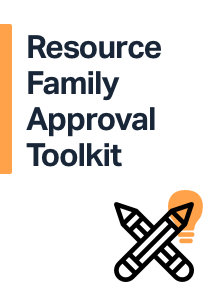Angie Schwartz
Policy Director
What does the election of Donald Trump and the momentum of a Republican-dominated Senate mean for the vulnerable children and families for whom we advocate? That is the question at the forefront of my mind as I try to process the results of this election. We must prepare for years of fierce fights to protect our clients. With that in mind, I looked at recent Republican budget proposals for a glimpse of what may be coming our way.
Last year alone, Republicans proposed the following:
- Repealing the Affordable Care Act, which has provided health insurance to over 16 million individuals who would otherwise not have been able to access coverage;
- Block granting Medicaid, the federal health insurance program that serves low-income children and families, and cutting federal funding for the program by over $900 billion dollars over the next decade resulting in states having to limit eligibility, cover fewer services, and/or lower payments to providers;
- Repeal of the Social Services Block Grant (SSBG), which provides $1.7 billion in flexible funding to states to use for a variety of social service activities including child care, substance abuse treatment, child welfare services, and special services for individuals with disabilities;
- Cutting Supplemental Nutrition Assistance Program (SNAP) benefits by $125 billion over ten years and converting the program to a block grant;
- Reduction of the Pell Grant, which provides direct grants to low-income college students, by $78 billion over 10 years;
- Expiration of improvements to the Earned Income Tax Credit (EITC) that would result in $159 billion in lost credits for 26 million working families;
- Significant reductions in Title I education funding, Head Start, and funding for the Individuals with Disabilities in Education Act.
Over the last decade, Republicans have proposed block granting numerous federal entitlement programs that serve millions of low-income children and families including:
- Title IV-E Foster Care Assistance;
- Supplemental Nutrition Assistance Program (SNAP);
- Head Start;
- Section 8 Housing Program;
- Medicaid.
While it is unlikely that all of these proposals will be taken up for consideration over the next few years, the impact of any one of these proposals could be devastating. The history of prior block grants is grim, as the majority of programs subject to a block grant lose substantial value over time. For example, Temporary Assistance for Needy Families (TANF) is the block grant that replaced the Aid to Families with Dependent Children (AFDC) program. The amount of funding for the TANF program has been frozen at $16.5 billion annually ever since the program was created in 1996. The result has been a steep decline in the number of families who received cash aid, despite growing need. According to the Center on Budget and Policy Priorities, “Over the last 20 years, the national TANF average monthly caseload has fallen by almost two-thirds — from 4.4 million families in 1996 to 1.6 million families in 2014 — even as poverty and deep poverty have worsened.” Block granting the Title IV-E foster care maintenance program, Medicaid, SNAP or Head Start would have similarly disastrous impacts on access to vital support for children across the country.
Elections have consequences, and as I review the Republican wish list with its aim to dismantle our social safety net, subjecting millions of families to deep poverty, I feel the fight that lies before us is formidable. I was hoping to spend the next couple years advocating for ever more progressive reforms and an expansion of the supports and services available to families. Instead, we will be fighting to maintain the gains we’ve managed to make so far, and struggling to hold off a tidal wave of cuts that would further expose vulnerable children to real suffering.
California has powerful leaders and committed child welfare advocates that are dedicated to the fight. What’s more, California has often stepped in when the federal government has not. For example, our state provided subsidized benefits to children who exited foster care to guardianships a full decade before the federal government followed suit. We have been on the cutting edge of efforts to reduce reliance on group homes and provide increased supports and services to caregivers so that more children can be raised in loving families. Over the next several years, California will continue to implement laws that bolster supports and services for distressed families and caregivers, even while we fend off the worst of the attacks by those at the federal level that seek to unravel these programs.
For all of these reasons, I take heart in the commitment expressed by the California legislature—if you missed their letter, be sure to read it here. We must shore up our resources, strengthen our resolve, and be ready for what lies ahead. Vulnerable youth will need us more than ever before.








